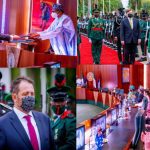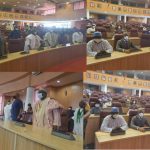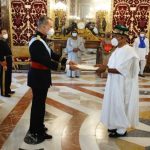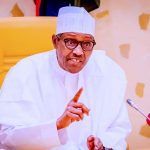President Bola Tinubu, has reaffirmed Nigeria’s strategic position in Africa as a bastion of peace, saying the nation will continue to play its role as a stabilizer on the continent.
He said this when he received letters of credence from the Egyptian Ambassador to Nigeria, Mohamed Ahmed.
President Tinubu emphasised the shared commitment of both countries to promoting global peace and stability through collaboration within international organizations, such as the United Nations.
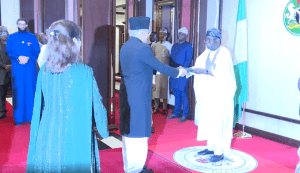
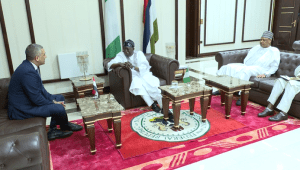
President Tinubu noted that since establishing diplomatic relations in 1961, Nigeria and Egypt have collaborated on key international priorities, including promoting regional peace, security, and stability.
The discussions at the meeting also touched on the situation in the Sahel and Sudan.
President Tinubu acknowledged Egypt’s role towards a truce in the crisis in Gaza.
Ambassador Ahmed conveyed President Abdel Fattah el-Sisi’s willingness to bolster economic partnership with Nigeria, emphasising Egypt’s interest in increasing trade and investments between the two countries.
In another discussion with Major-General Sohail Ahmed Khan (retired), High Commissioner of Pakistan, President Tinubu described the Ambassador’s military background as invaluable for exchanging ideas to expand security and defence cooperation.
He underscored the need for global cooperation in combating terrorism and violent extremism.
In a separate meeting with Ambassador Athanasios Kotsionis of Greece, President Tinubu reiterated his administration’s commitment to an open-door policy that encourages collaboration and progress for the benefit of all.
He restated Nigeria’s commitment to strengthening bilateral relations with Greece and building bridges of cooperation to address common challenges.
President Bola Tinubu, has reaffirmed Nigeria’s strategic position in Africa as a bastion of peace, saying the nation will continue to play its role as a stabilizer on the continent.
He said this when he received letters of credence from the Egyptian Ambassador to Nigeria, Mohamed Ahmed.
President Tinubu emphasised the shared commitment of both countries to promoting global peace and stability through collaboration within international organizations, such as the United Nations.


President Tinubu noted that since establishing diplomatic relations in 1961, Nigeria and Egypt have collaborated on key international priorities, including promoting regional peace, security, and stability.
The discussions at the meeting also touched on the situation in the Sahel and Sudan.
President Tinubu acknowledged Egypt’s role towards a truce in the crisis in Gaza.
Ambassador Ahmed conveyed President Abdel Fattah el-Sisi’s willingness to bolster economic partnership with Nigeria, emphasising Egypt’s interest in increasing trade and investments between the two countries.
In another discussion with Major-General Sohail Ahmed Khan (retired), High Commissioner of Pakistan, President Tinubu described the Ambassador’s military background as invaluable for exchanging ideas to expand security and defence cooperation.
He underscored the need for global cooperation in combating terrorism and violent extremism.
In a separate meeting with Ambassador Athanasios Kotsionis of Greece, President Tinubu reiterated his administration’s commitment to an open-door policy that encourages collaboration and progress for the benefit of all.
He restated Nigeria’s commitment to strengthening bilateral relations with Greece and building bridges of cooperation to address common challenges.
President Bola Tinubu, has reaffirmed Nigeria’s strategic position in Africa as a bastion of peace, saying the nation will continue to play its role as a stabilizer on the continent.
He said this when he received letters of credence from the Egyptian Ambassador to Nigeria, Mohamed Ahmed.
President Tinubu emphasised the shared commitment of both countries to promoting global peace and stability through collaboration within international organizations, such as the United Nations.


President Tinubu noted that since establishing diplomatic relations in 1961, Nigeria and Egypt have collaborated on key international priorities, including promoting regional peace, security, and stability.
The discussions at the meeting also touched on the situation in the Sahel and Sudan.
President Tinubu acknowledged Egypt’s role towards a truce in the crisis in Gaza.
Ambassador Ahmed conveyed President Abdel Fattah el-Sisi’s willingness to bolster economic partnership with Nigeria, emphasising Egypt’s interest in increasing trade and investments between the two countries.
In another discussion with Major-General Sohail Ahmed Khan (retired), High Commissioner of Pakistan, President Tinubu described the Ambassador’s military background as invaluable for exchanging ideas to expand security and defence cooperation.
He underscored the need for global cooperation in combating terrorism and violent extremism.
In a separate meeting with Ambassador Athanasios Kotsionis of Greece, President Tinubu reiterated his administration’s commitment to an open-door policy that encourages collaboration and progress for the benefit of all.
He restated Nigeria’s commitment to strengthening bilateral relations with Greece and building bridges of cooperation to address common challenges.
President Bola Tinubu, has reaffirmed Nigeria’s strategic position in Africa as a bastion of peace, saying the nation will continue to play its role as a stabilizer on the continent.
He said this when he received letters of credence from the Egyptian Ambassador to Nigeria, Mohamed Ahmed.
President Tinubu emphasised the shared commitment of both countries to promoting global peace and stability through collaboration within international organizations, such as the United Nations.


President Tinubu noted that since establishing diplomatic relations in 1961, Nigeria and Egypt have collaborated on key international priorities, including promoting regional peace, security, and stability.
The discussions at the meeting also touched on the situation in the Sahel and Sudan.
President Tinubu acknowledged Egypt’s role towards a truce in the crisis in Gaza.
Ambassador Ahmed conveyed President Abdel Fattah el-Sisi’s willingness to bolster economic partnership with Nigeria, emphasising Egypt’s interest in increasing trade and investments between the two countries.
In another discussion with Major-General Sohail Ahmed Khan (retired), High Commissioner of Pakistan, President Tinubu described the Ambassador’s military background as invaluable for exchanging ideas to expand security and defence cooperation.
He underscored the need for global cooperation in combating terrorism and violent extremism.
In a separate meeting with Ambassador Athanasios Kotsionis of Greece, President Tinubu reiterated his administration’s commitment to an open-door policy that encourages collaboration and progress for the benefit of all.
He restated Nigeria’s commitment to strengthening bilateral relations with Greece and building bridges of cooperation to address common challenges.
President Bola Tinubu, has reaffirmed Nigeria’s strategic position in Africa as a bastion of peace, saying the nation will continue to play its role as a stabilizer on the continent.
He said this when he received letters of credence from the Egyptian Ambassador to Nigeria, Mohamed Ahmed.
President Tinubu emphasised the shared commitment of both countries to promoting global peace and stability through collaboration within international organizations, such as the United Nations.


President Tinubu noted that since establishing diplomatic relations in 1961, Nigeria and Egypt have collaborated on key international priorities, including promoting regional peace, security, and stability.
The discussions at the meeting also touched on the situation in the Sahel and Sudan.
President Tinubu acknowledged Egypt’s role towards a truce in the crisis in Gaza.
Ambassador Ahmed conveyed President Abdel Fattah el-Sisi’s willingness to bolster economic partnership with Nigeria, emphasising Egypt’s interest in increasing trade and investments between the two countries.
In another discussion with Major-General Sohail Ahmed Khan (retired), High Commissioner of Pakistan, President Tinubu described the Ambassador’s military background as invaluable for exchanging ideas to expand security and defence cooperation.
He underscored the need for global cooperation in combating terrorism and violent extremism.
In a separate meeting with Ambassador Athanasios Kotsionis of Greece, President Tinubu reiterated his administration’s commitment to an open-door policy that encourages collaboration and progress for the benefit of all.
He restated Nigeria’s commitment to strengthening bilateral relations with Greece and building bridges of cooperation to address common challenges.
President Bola Tinubu, has reaffirmed Nigeria’s strategic position in Africa as a bastion of peace, saying the nation will continue to play its role as a stabilizer on the continent.
He said this when he received letters of credence from the Egyptian Ambassador to Nigeria, Mohamed Ahmed.
President Tinubu emphasised the shared commitment of both countries to promoting global peace and stability through collaboration within international organizations, such as the United Nations.


President Tinubu noted that since establishing diplomatic relations in 1961, Nigeria and Egypt have collaborated on key international priorities, including promoting regional peace, security, and stability.
The discussions at the meeting also touched on the situation in the Sahel and Sudan.
President Tinubu acknowledged Egypt’s role towards a truce in the crisis in Gaza.
Ambassador Ahmed conveyed President Abdel Fattah el-Sisi’s willingness to bolster economic partnership with Nigeria, emphasising Egypt’s interest in increasing trade and investments between the two countries.
In another discussion with Major-General Sohail Ahmed Khan (retired), High Commissioner of Pakistan, President Tinubu described the Ambassador’s military background as invaluable for exchanging ideas to expand security and defence cooperation.
He underscored the need for global cooperation in combating terrorism and violent extremism.
In a separate meeting with Ambassador Athanasios Kotsionis of Greece, President Tinubu reiterated his administration’s commitment to an open-door policy that encourages collaboration and progress for the benefit of all.
He restated Nigeria’s commitment to strengthening bilateral relations with Greece and building bridges of cooperation to address common challenges.
President Bola Tinubu, has reaffirmed Nigeria’s strategic position in Africa as a bastion of peace, saying the nation will continue to play its role as a stabilizer on the continent.
He said this when he received letters of credence from the Egyptian Ambassador to Nigeria, Mohamed Ahmed.
President Tinubu emphasised the shared commitment of both countries to promoting global peace and stability through collaboration within international organizations, such as the United Nations.


President Tinubu noted that since establishing diplomatic relations in 1961, Nigeria and Egypt have collaborated on key international priorities, including promoting regional peace, security, and stability.
The discussions at the meeting also touched on the situation in the Sahel and Sudan.
President Tinubu acknowledged Egypt’s role towards a truce in the crisis in Gaza.
Ambassador Ahmed conveyed President Abdel Fattah el-Sisi’s willingness to bolster economic partnership with Nigeria, emphasising Egypt’s interest in increasing trade and investments between the two countries.
In another discussion with Major-General Sohail Ahmed Khan (retired), High Commissioner of Pakistan, President Tinubu described the Ambassador’s military background as invaluable for exchanging ideas to expand security and defence cooperation.
He underscored the need for global cooperation in combating terrorism and violent extremism.
In a separate meeting with Ambassador Athanasios Kotsionis of Greece, President Tinubu reiterated his administration’s commitment to an open-door policy that encourages collaboration and progress for the benefit of all.
He restated Nigeria’s commitment to strengthening bilateral relations with Greece and building bridges of cooperation to address common challenges.
President Bola Tinubu, has reaffirmed Nigeria’s strategic position in Africa as a bastion of peace, saying the nation will continue to play its role as a stabilizer on the continent.
He said this when he received letters of credence from the Egyptian Ambassador to Nigeria, Mohamed Ahmed.
President Tinubu emphasised the shared commitment of both countries to promoting global peace and stability through collaboration within international organizations, such as the United Nations.


President Tinubu noted that since establishing diplomatic relations in 1961, Nigeria and Egypt have collaborated on key international priorities, including promoting regional peace, security, and stability.
The discussions at the meeting also touched on the situation in the Sahel and Sudan.
President Tinubu acknowledged Egypt’s role towards a truce in the crisis in Gaza.
Ambassador Ahmed conveyed President Abdel Fattah el-Sisi’s willingness to bolster economic partnership with Nigeria, emphasising Egypt’s interest in increasing trade and investments between the two countries.
In another discussion with Major-General Sohail Ahmed Khan (retired), High Commissioner of Pakistan, President Tinubu described the Ambassador’s military background as invaluable for exchanging ideas to expand security and defence cooperation.
He underscored the need for global cooperation in combating terrorism and violent extremism.
In a separate meeting with Ambassador Athanasios Kotsionis of Greece, President Tinubu reiterated his administration’s commitment to an open-door policy that encourages collaboration and progress for the benefit of all.
He restated Nigeria’s commitment to strengthening bilateral relations with Greece and building bridges of cooperation to address common challenges.




